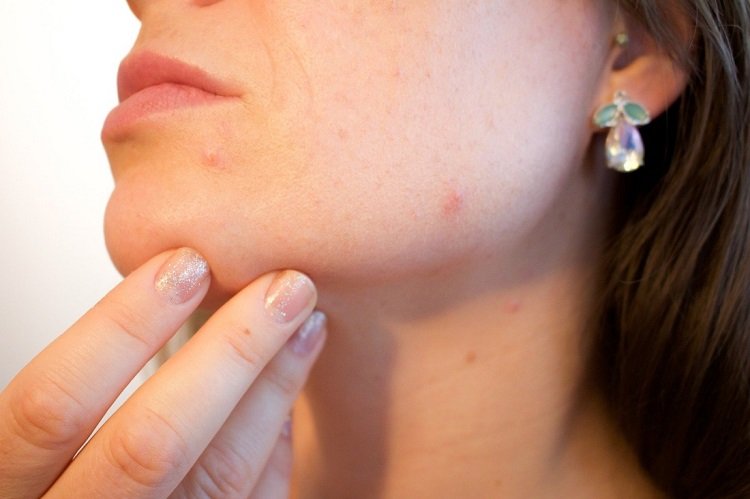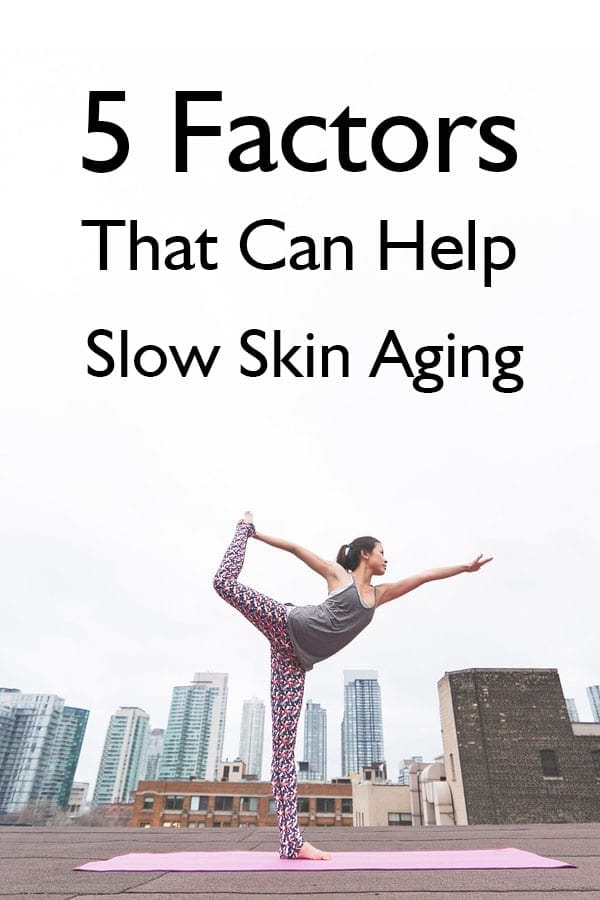People often judge your skin’s health as a principal factor of your beauty. While there is no shame in wanting to look your best, it’s also important to remember that when you take care of your skin from the inside, you are taking care of other organs that keep you healthy, vital, and energetic – all of which are attributes that contribute to your overall beauty.
Your skin is a complex biological organ that is influenced by several internal and external elements. As you read through the five factors that help reduce skin aging, remember that these strategies are meant to work together to improve the health and vitality of your skin. Since your skin begins aging nearly from birth, the earlier you start taking care of your youthful appearance, the longer it will last. However, do not be discouraged since you can start at any time in your life and still enjoy positive results.
Although there are five distinct categories of strategies you can use, in each, there are multiple tactics. Start by incorporating one tactic at a time and keep it up for about six weeks before adding another. It is easy to get overwhelmed by adding an assorted number of steps to your daily routine, thus making it difficult to maintain the changes. Instead, wait four to six weeks until the new addition has become a habit and easily fits into your schedule, and then add another!
Stimulation

Your skin does well when it is stimulated. There are several different types of stimulation, such as mechanical, pressure, and electrical, but not all of them help improve the quality of your skin and elasticity. You might be familiar with skin massaging devices sold in most big-box and beauty stores. While the advertising looks good, research also confirms that this type of mechanical stimulation has an anti-aging effect in the lab and on your skin.
The devices help stimulate the production of collagen from fibroblasts located under the skin. This helps improve the look, texture, and elasticity of your skin cells. The second type of mechanical stimulation is shaving. According to Kate Somerville, facialist to many Hollywood stars, reputed beauties Marilyn Monroe and Elizabeth Taylor were known for shaving their faces.
The process has become so popular, manufacturers are producing electrical razors made specifically for women’s faces. Hair removal helps the application of makeup, but the action against the skin also helps stimulate underlying collagen production and can improve the quality of your skin over time.
Nutrition
Some of the best strategies you can use to help take care of your skin and slow the aging process is from the inside out. Although wound care specialists, dermatologists, and estheticians have a slew of weapons they can use, the results of their efforts will be significantly less than the potential when your underlying skin is not cared for nutritionally. For instance, antioxidants help to scavenge free radicals and reduce the production of peroxide, which damages your skin. The most important source of these antioxidants is from the foods you eat.
Essentially this means you are what you eat. Your nutrition also has a significant impact on your weight maintenance. Being underweight and overweight influences your skin. For people who are underweight, their skin tends to dry out and develop wrinkles. By contrast, too much food can result in infections, stretch marks, and skin irritations. Your best choice for a strong foundation of healthy nutrition is to shop along the outside walls of your grocery store.

This means eliminating or drastically reducing processed foods and foods with added sugar or high-fructose corn syrup. Inflammatory foods can create skin problems and include processed meat, sugary drinks, fried foods, white pasta, soybean and vegetable oil, and gluten products. Lean sources of high protein from chicken, beans, nuts, and lentils help provide your skin with the building blocks it needs to produce healthy cells.
You may have already guessed that smoking and drinking excessive amounts of alcohol are also not good for your skin. Both lead to different kinds of health problems and reduce your body’s ability to absorb necessary nutrients. This, of course, has a significant effect on your skin. In addition to this, smoking triggers the development of fine lines around the mouth and wrinkles in the forehead. Excessive drinking can discolor the skin over time and reduce the muscle tone in your face, which in turn affects wrinkling, double chin, and sagging cheeks.
Supplementation
It can be nearly impossible to get every vitamin you need from your food. Conventional agriculture has depleted the number of vitamins and minerals found in the soil and therefore has affected the food you eat. The following supplements are necessary for healthy skin. Consider using supplements when your nutritional plan does not include foods high in these.
Zinc
Topical and consumed zinc supplementation has been used for decades to help improve skin health. In the past years, it has also been used to treat warts, acne, rosacea, and even skin cancer. Zinc is an essential micronutrient that helps regulate your genetic expression, plays a role in your immune function, and is a necessary component to wound healing.
Supplementing with zinc can increase vitamin A levels in the blood that can have a positive effect on acne. However, as with many other things, too much of a good thing is not a better thing. Your body requires a balance of copper and zinc to maintain a healthy immune system. Consistently supplementing with zinc can lead to an imbalance and an impaired immune system. Foods high in zinc include meat, dairy, nuts, and legumes, such as chickpeas and peanuts.
Vitamins C and E
Vitamins C and E are strong antioxidants. Clinical studies have shown their antioxidative protection is greater when they are used in combination rather than when either is used alone. Vitamin C helps increase collagen production and regenerates oxidized vitamin E. When used topically in cosmeceuticals, they can help inhibit sunburns and reduce UV photoaging. Foods high in vitamin C include citrus fruits, tomatoes, red and green peppers, broccoli, and strawberries. Foods high in vitamin E include sunflower seeds, almonds, avocados, spinach, and butternut squash.
Astaxanthin
This supplement is sometimes called the “King of the Carotenoids,” as it is a naturally occurring compound that is one of the most powerful antioxidants found in nature. There is evidence that it helps protect hearing, reduces the risk of cardiovascular disease, supports your immune system, and has neuroprotective effects.
In other words, it does all that and it helps protect your skin. Food that is high in astaxanthin is wild-caught Alaskan salmon, which is one of the most nutritious foods you can add to your diet. It is rich in omega-3 fatty acids that help to balance the overabundance of omega-6 fatty acids most people get in a Western diet.
Protection
Another aspect of reducing the signs of skin aging are those that fall into the category of protection. While you may have considered protection from UV rays as a necessary component of slowing skin aging, you may not have thought about your hands.
Sun Screen
Most dermatologists recommend protecting your skin from the sun every day. Seeking out shade, using sun protective clothing and sunscreen are common recommendations. However, one place most people do not think about is their hands. It is important to remember to protect your skin not only while you’re outside gardening or at the beach, but also during everyday activities. For instance, while driving, your hands are exposed to UV rays through the front windshield. Sitting in the office you are exposed to UV rays through the windows.

Sleeping
The results of one study in 2019 showed most people living in the US are sleeping fewer hours and are less satisfied with the quality of their sleep. On average, 52% who answered the survey reported they got six hours or less of sleep each night. While sleep is vital to your mental and physical health, researchers have also found that people who chronically got poor sleep quality had more signs of skin aging and were less satisfied with the appearance of their skin.
Simple steps you can take to improve the quality of your sleep include sleeping in a completely darkened room by using blackout blinds or a sleep mask. Set a nighttime routine that helps your body know it is time for bed. Do not use digital equipment within one hour of going to sleep and adjust your schedule during the day to ensure you have budgeted enough time to sleep each night.
Facial Expressions
Did your mother ever warn you that if you made a funny face your face might freeze that way? She is not far off! When you make repetitive facial expressions, it requires the contraction and relaxation of muscles in your face. Repeatedly contracting the same muscles can make the lines in your face permanent. You need only to look at crow’s feet at the corner of the eyes to realize that squinting can take a toll on your face. Seek to wear sunglasses while you are outside, which helps to reduce squinting.
Moisturize
Daily activities in the sun, cold, air conditioning, and heating can take a toll on your skin. Harsh acne treatments or chronic chemical skin peels can also produce skin that appears thin and wrinkled. This is related to the depletion of the skin’s natural oils, which reduces elasticity and speeds the signs of aging. It is important to moisturize your face daily, and sometimes throughout the day, to protect it from damaging environmental factors. Choose your moisturizer carefully as it is important to use a product that is healthy for you topically and internally. Your skin is like a sponge, and anything you put on it can be absorbed into your body. Be sure the moisturizer you use is not toxic.
Stress and Exercise
Chronic, high levels of stress are a good recipe for aging your body inside and out. Stress can increase the number of stress hormones released, which affects your energy level, mental health, and immune health. Stress can increase your risk of illness, which in turn can promote the aging process. Although a small amount of stress is healthy for your body, chronic stress is damaging.
It is important to practice some stress-reducing strategies daily and each week. You will find that exercise is a great stress reducer. Yoga, meditation, and aerobic and strength training are all ways your body can use to reduce stress and reduce the signs of aging.
We cannot stop the years from ticking by, but you can take action to slow the aging process and reduce the effect it has on your skin. Using mechanical stimulation, good nutrition, exercise, and strategies that protect your health, you can enjoy many of the benefits of a slowed aging process, including more energy, better health, and beautiful skin.


